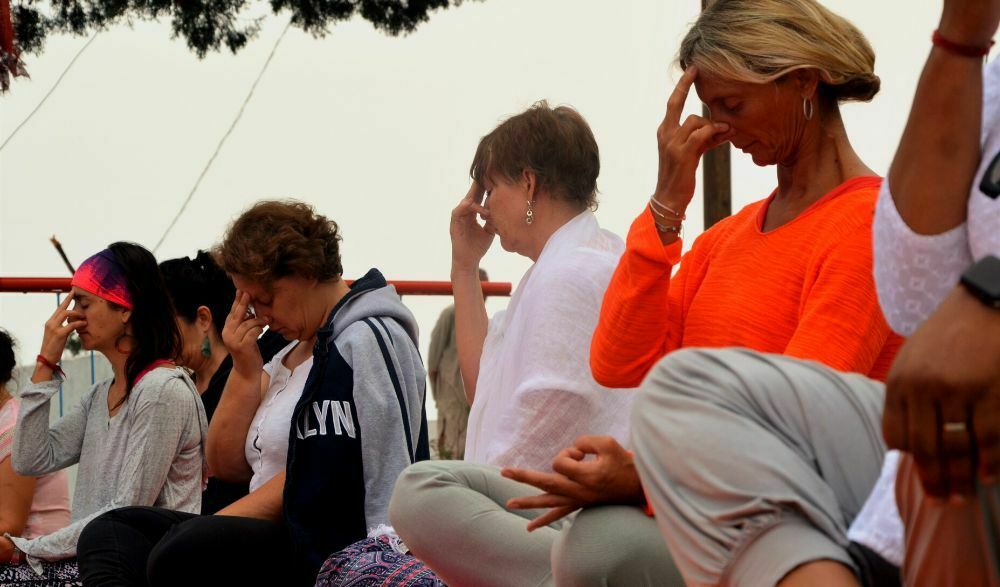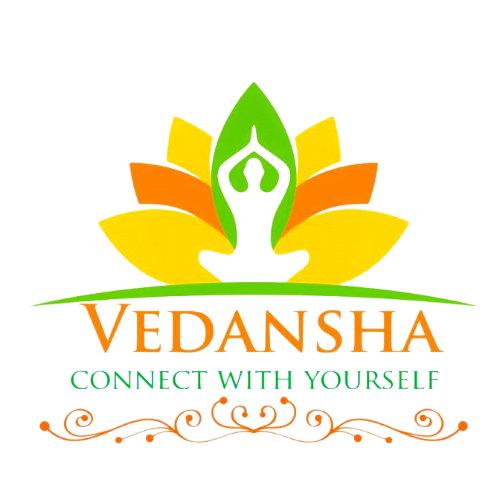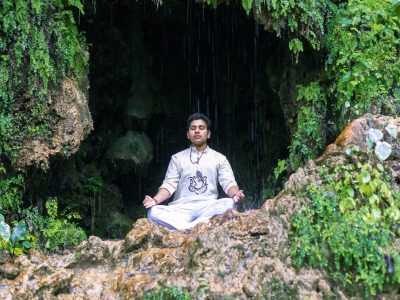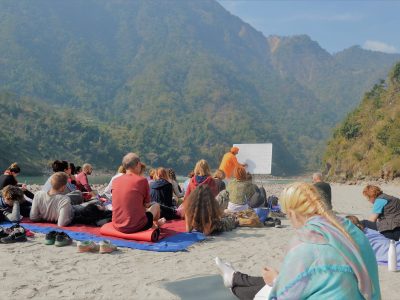
200 Hour Pranayama Teacher Training in Rishikesh
200 Hour Pranayama Teacher Training in Rishikesh India is designed for people who want to concentrate deeper on breathing and the meditative aspect of yoga. According to ancient scriptures, yoga is considered not only an asana practice but a union between body and mind.
When we say in India “we are practising yoga” we suppose to do all – asana, pranayama, mantra and meditation.
After completion of the course, the Student can get a Certificate of Teacher of Pranayama of Yoga Alliance USA in the form of continuing education after a minimum of 200 hours of Yoga TTC.
Pranayama can not be separated from Asana Meditation or mantra, why? Because the purpose of pranayama yoga itself – is getting bliss or liberation for the mind. Normalisation of breath, increasing the time of spontaneous retention and at least entering in meditative state – that is a goal of Pranayama. “Long breath – long life, short breath – short life”, – developing correct breath not only calms the mind but also helps to cure some common diseases.
We use pranayama as a tool during asana, meditation, and mantra. Because people are different, everyone can find a suitable tool how to enter a deeper state of meditation. Our classes are made by the way that you can try all the main tools of yoga and master those practices that lead in your case to a deeper state of concentration.
``Inhale, hold Kumbhaka (retention), heal yourself, extend your life as long you are without breath`` - Dr. S.K Pandey
Our Program For 200 Hour Pranayama Yoga Teacher Training –
| Duration | Study Days | Free Day | Graduation | Price |
|---|---|---|---|---|
| 27 Days/26 Nights | Monday-Saturday | Sunday | International Valid Certificate Of Pranayama Teacher According To International Yoga Alliance USA YACEP | 1500 USD In Twin Shared Room 1700 USD In Private Room |
Benefits Of 200 Hour Pranayama Teacher Training In Rishikesh India
- New ability in career – make Pranayama your profession and teach worldwide
- Learn deep the correct practice of asana, pranayama, meditation and follow healthy lifestyle
- Balance your body & mind
- Offer people who can’t not do asana, pranayama as an alternative to continue yoga experience
- Increase your energy level and open your hidden inner power by awaking of Kundalini energy
- Protect yourself from negativity by using secret techniques of healing and purification
- Control your breath, control your mind (energy that generated in your body can be used to be steady and calm in emergency situations of your life, you will be more resistant to stress and overworking)
- Develop body flexibility & steadiness
- Cure yourself, your friends & relatives with ancient breath techniques
- Improve your immune system and be resistant to diseases by adding pranayama practice in your daily routine
- You will be not only yoga teacher but life style instructor and can guide people in healthy lifestyle
- Learn vegetarian way of life and reach new level of wellness with healthy nutrition
- Show your friends, relatives, clients true pranayama practice and become a leader trainer in your yoga work place
200 Hour Pranayama Teacher Training Course Is Suitable For
- Beginner, intermediate, advanced practitioner
- For people who have desire to learn pranayama deeper
- For meditation and wellness teachers
- For medical and education staff
- For divers and all who want to experience true spontaneous breath retention
What You Learn In 200 Hour Pranayama Teacher Training Course
- Retention practice and yogic breathing
- How to reach spontaneous retention safely
- Variety of pranayama techniques
- Awaking of Kundalini with Pranayama
- Chakra Work in Pranayama
- Yogic Nutrition that helps to increase prana flow
- Kriyas that improve prana energy
- Postures for pranayama
- Anatomy and physiology of breath and retention
- Teaching Methodology
- Practicum & Sequencing
- Get important information about your energy body with aura check up
200 Hour Pranayama Teacher Training Schedule In Rishikesh 2024-25
| Course | Starting Date | End Date | Booking |
|---|---|---|---|
| 200 Hour Pranayama Teacher Training Course | February 01, 2024 | February 27, 2024 | Apply Now |
| 200 Hour Pranayama Teacher Training Course | March 01, 2024 | March 27, 2024 | Apply Now |
| 200 Hour Pranayama Teacher Training Course | April 01, 2024 | April 27, 2024 | Apply Now |
| 200 Hour Pranayama Teacher Training Course | May 01, 2024 | May 27, 2024 | Apply Now |
| 200 Hour Pranayama Teacher Training Course | June 03, 2024 | June 29, 2024 | Apply Now |
| 200 Hour Pranayama Teacher Training Course | July 01, 2024 | July 27, 2024 | Apply Now |
| 200 Hour Pranayama Teacher Training Course | August 01, 2024 | August 27, 2024 | Apply Now |
| 200 Hour Pranayama Teacher Training Course | September 02, 2024 | September 28, 2024 | Apply Now |
| 200 Hour Pranayama Teacher Training Course | October 01, 2024 | October 27, 2024 | Apply Now |
| 200 Hour Pranayama Teacher Training Course | November 01, 2024 | November 27, 2024 | Apply Now |
| 200 Hour Pranayama Teacher Training Course | December 02, 2024 | December 28, 2024 | Apply Now |
| 200 Hour Pranayama Teacher Training Course | January 01, 2025 | January 27, 2025 | Apply Now |
Includes-
- Internal valid Certificate of Pranayama Teacher ( Yoga Alliance USA YACEP )
- Theoretical and practical skills.
- Mala (string of beads) energised by our Guru Ji Yogachariya Dr. S.K.Pandey, PhD (Yoga & Naturopathy).
- 26 nights accommodation.
- Wi-Fi
- 3 times of yogic nutrition, beverages
- Yogic cleansing session
- Study materials
- Cleansing Kit.
- T-shirts (1) with symbolic of school
- 2 excursions in Himalaya
- 1 short aura check up
- 2 ayurvedic massages
- Accompanying and supporting during time of staying in the Institute, help provided 24 Hours
Optional For Moderate Payment
- Pick up and drop from the airport
- Other ayurvedic procedures
- Detox ayurvedic herbal program
- Modern automatic Hydrocolontherapy session
- Ayurvedic doctor consultation
- Number of excursions more than mentioned above
Detailed Aura check-up with providing of written report about Aura statement, disturbances in Aura if they are present, supporting methods and treatment advices of naturopathic specialist (individual plan of asana postures, pranayama, herbs, meditative practice).
- Detailed horoscope assessment
- Extra night of accommodation
TIME TABLE
| 06:00 am – 06:30 am | Wake Up And Cleansing. |
|---|---|
| 06:30 am – 07:00 am | Shatkriya And Herbal Tea (Yogic Cleansing With Jala Neti (Special Techniques Of Nose Cleansing), Pooja (Mantra Recitation & Fire Ceremony Purification). |
| 07:00 am – 08:30 am | Asanas practical class for developing of stability |
| 08:30 am – 09:30 am | Pranayama: breathing exercises with Mudra, Bandha, Retention |
| 09:30 am – 10:30 am | Breakfast: Special Yogic Menu. |
| 10:30 am – 11:30 am | Yoga Philosophy/Ayurveda/Teaching Methodology. |
| 11:30 am – 12:30 pm | Pranayama theory & practice |
| 13:00 pm – 14:00 pm | Lunch |
| 14:00 pm – 15:00 pm | Free Time. |
| 15:00 pm – 16:00 pm | Special breathing techniques and energy locks |
| 16:00 pm – 17:00 pm | Breathing anatomy, physiology, pathophysiology |
| 17:30 pm – 18:30 pm | Yoga Nidra/ guided Meditation: guided relaxation practice, meditation and concentration. |
| 18:30 pm – 19:30 pm | Dinner. |
| 20:00 pm – 22:00 pm | Free Time. |
| 22:00 pm – 06:00 am | Sleep. |
Note:- Time table can be changed during to teaching process.
200 Hour Pranayama Teacher Training Course Teaching Plan
Pranayama Theory
- Main aspects of Pranayama
- Fundamental Pranayama Techniques & Benefits (Abdominal breathing, Preparational breathing, Kapalabhati, Nadi Shodana with/without retention Level I, II, Ujjayi breathing, Bramari, Bhastrika, Shitali, Shitkari, Surya Bheda & Chandra Bheda, Plavini).
- Levels of pranic body.
- Influence of pranayama on our lifestyle.
- How to calculate correlation between life span and breath length.
- Variety of Positions for Pranayama practice. Ways of correct adjustment for energy flow
- Kriyas (Body Cleansing Methods): (Neti, Sutra Neti, Kapalabhati, Trataka, Shanka Prakshalana, Netra Shuddhi). Benefits, precautions. Dauti. Why not used nowadays.
- Retention or Kumbhaka. Main principles. Step by step guide. Safety techniques and precautions.
- Mudra and bandha that useful for Pranayama
- Ashwini Mudra, its role in energy work
- Dyana, Ajali, Prithvi, Varuna, Shakti, Gyana, Chin, Shambhavi, Khechari Mudra, Hansi mudra, Vayu mudra, akash Mudra, Shunya Mudra, Surya mudra, Jalodarnashak mudra, Apan mudra, Pran Mudra, Moola bandha, Uddyana Bandha, Jalandhara Bandha
- Obstacles in Pranayama practice
- Contemporary evidence of pranayama
- Room for pranayama practice
- Science of Prana vidya
- Mapping the body
- Pranayama as 4th Level of 8 Limbs of Ashtanga yoga
- Origin of disease according prana and pranayama
- Pranic healing
- Difference between Reiki and Prana healing
- Transmission of energy
- Education of pranayama
- Karmic laws and prana energy
- Prana pratishta
- Mantra and pranayama
- Kirlian photography and pranic body
- Nadis and chakras in pranayama practice
- Important conditions of pranayama practice
- Lost of personal prana & reestablishment of it the body
- Role of Prana in yoga nidra
- Developing of inner body awareness
- Developing of outer body awareness
- Awareness of panch prana
- Awareness of pranayama kosha
- Retention and its stages
- Prana and congenital diseases
- Prana and cancer
- Pranayama research worldwide
- Prana and breath length calculation
- Prana, Lungs and Yin Channel in TCM
- Balancing of Vital energy
- Circulation of energy in the lung
- Prana overflow and insufficiency
- Main prana disorders
- Pranayama sequence
Pranayama Practice
- Nadi Shodhana Pranayama. Levels, retention, safety, performance, benefits
- Kapalabhati. Levels, retention, safety, performance, benefits
- Surya Bheda. Levels, retention, safety, performance, benefits
- Chandra Bheda. Levels, retention, safety, performance, benefits. When to use.
- Bramari. Levels, retention, safety, performance, benefits
- Bhastrika pranayama. Levels, retention, safety, performance, benefits
- Sheetali pranayama. Levels, retention, safety, performance, benefits
- Shetkari Pranayama. Levels, retention, safety, performance, benefits
- Ujjayi breathing. Levels, retention, safety, performance, benefits
- Plavini pranayama. Levels, retention, safety, performance, benefits
- Real result of pranayama practice.
- Important role of Ashwani mudra
- Pranayama in yoga class
- What is pancha prana (Prana, Apana, Udana, Samana, Vyana)
- Pancha prana in spiritual healing
- How to reach Kevala Kumbhaka and what in hidden there?
- Contemporary research on pranayama
- Room for pranayama practice
- Pranayama and aromatherapy
- Inner space
- Vyana, Udana, Samana, Apana, Prana Awareness
- Expansion and contraction of pranic body
- Rotation of consciousness
- Winter and Summer pranayama
- Prana and Charka
- Development awareness of mooladhara chakra through pranayama
- Development awareness of Swadhistana chakra through pranayama
- Development awareness of Manipura chakra through pranayama
- Development awareness of Anahata chakra through pranayama
- Development awareness of Vishuddhi chakra through pranayama
- Development awareness of Ajna chakra through pranayama
- Development awareness of Sahasrara chakra through pranayama
- Frontal and Spinal passage
- Passage of Pancha Prana
- Prana Nidra
- Circulation prana in Ida and Pingala Nadi
- Prana Visualisation
- Rising and storing prana
- Expansion and relaxation with help of Prana
- Distribution of Prana
- Pranayama and Mantra – hidden secrets
- Prana Yoga
- Prana Vidya
- Special Retention development exercises
Ashtanga Yoga Asana – Practical Aspects
- Asana in Ashtanga practice
- Surya Namaskara Part A and B. Sun salutation
- Utkatasana chair pose
- Padangusthasana Big toe pose
- Padahastasana Hand to foot forward bend pose
- Utthita Trikonasana extended triangle pose
- Parivrtta Trikonasana revolved triangle pose
- Trikonasana Variation 1, 2 Triangle pose
- Parivrtta parsvakonasana revolved side angle pose
- Utthita parshvakonasana extended side angle pose
- Parasarita padottanasana a b c d wide legged extended pose
- Parsvottanasana intense side stretch pose
- Utthita hasta padangusthasana A,B,C,D Extended hand to big toe pose
- Ardha baddha padmottanasana half bound lotus pose
- Samastithi simple standing pose
- Uttanasana A,B standing half forward bend
- Chaturanga dandasana four limbed staff pose
- Urdhva mukha svanasana upward facing dog pose
- Andho Mukha svanasana downward facing dog pose
- Veerbhadra asana I, II, III warrior yoga pose
- Paschimottanasana A, B,C,D seated forward bend
- Purvottanasana upward plank pose
- Ardha baddha padma paschimottanasana half bound lotus intense west stretch
- Triang mukhaikapada paschimottanasana three parts forward bend pose
- Janusirsasana A,B,C,D head to knee pose
- Marichyasana A, B, C, D Marichi’s pose
- Navasana boat pose
- Bhuja pindasana shoulder pressing pose
- Kurmasana tortoise pose
- Supta Kurmasanasleeping tortoise pose
- Garbha pindasana embryo pose
- Kukkutasana rooster pose
- Baddha konasana A,B,C Bound reclining pose
- Upavistha konasana A,B wide angle forward seated pose
- Suptakonasana Reclining Angle Yoga Pose Yoga
- Supta Padangusthasana A,B,C Reclined Big Toe Pose
- Savasana corpse pose
Hatha Yoga Asana – Practical Aspects
Backward bending postures
- Bhujangasana (cobra pose)
- Tiryaka Bhujangasana (Twisting cobra pose)
- Bhujangasana (cobra pose)
- Ardha Salabhasana (Half Locust pose)
- Saral Dhanurasana (Easy bow pose)
- Ustrasana (Camel pose)
- Setu Asana (Bridge pose)
- Surya namaskar (Salutation to Sun with devine Mantra)
Twisting Pose
- Meru Vakrasana (Spinal twist)
- Ardha Matsyendrasana (Half Spinal twist)
- Bhu Namanasana (Spinal Twist Prostration pose)
- Parivritta Janu Sirsasana (Spinal Twist Prostration pose)
Forward bending postures
- Paschimottanasana (Seated forward bend)
- Pada Parasar Paschimottanasana (Legs spread back Stretch pose)
- Janu Sirsasana (Head to knee pose)
- Adha Padma Paschimottanasana (Half Lotus back stretching pose)
- Padahastasana (Hand to foot pose)
- Sirsa Angustha Yogasana (Head to Toe Pose)
- Dandasana (Staff pose)
Inversion Postures
- Sarvangasana (Shoulderstand)
- Salamba Sirsasana (Suported headstand pose)
- Plow pose (Halasana)
- Viparita Karani (Legs up the wall pose)
Balancing Postures
- Vrikshasana (Tree pose)
- Garudasana (Eagle pose)
- Pada Angustasana (Tip toe pose)
- Baka Dhayanasana (Crow pose)
- Padmasana (Lotus pose)
- Vajrasana (Thunderbolt pose)
- Majrari Asana (Cat stretch pose)
- Vyaghrasana (Tiger pose)
- Shashankasana (Hair pose)
- Ardha Ushtrasana (Half Camel pose)
- Supta Vajrasana (Sleeping Thunderbolt pose)
Pawanmuktasana Series
- Anti-Rheumatic group
- Digestive abdominal group
- Shakti Bandha Asana
Meditation And Concentration
- Basics of meditation and concentration
- Difference of these two practices
- Basic requirements for meditation
- Types of Meditation
- Standard Meditation Practice
- Om Meditation
- AUM Meditation
- Trataka with object & candle
- Vaju Meditation
- Jal Meditation
- Akasha Meditation
- Agni Meditation
- Prithvi Meditation
- Yoga Nidra
- Sound meditation
- Mantra meditation
- Vigyan Bhairava Breath Meditation
- Satnam Meditation
- OSHO Natraj Meditation
- OSHO Kundalini Meditation
- OSHO Nada Brahma Meditation
- OSHO No Dimensions Meditation
- Antar mouna meditation
- Walking meditation
- Ham- so, So-ham meditation
- Ajapa/japa
- Ida/Pingala spinal rotation
- Hridayakasha Dharana
- Panchaprana Dharana, Pranava Dhyana)
- Visualisation & concentration
- Obstacles in meditation
- Concept of meditation Step by step
- Postures for meditation practice
Mantra & Sanskrit
- Main sanskrit characteristics
- How to pronounce sanskrit letters correct
- Role of Mantra in Yoga education
- Mantra and connection with cosmic powers
- Mantra & pray. Main features.
- Power of original sanskrit mantra
- Guru Mantra
- Ganesh Mantra
- Shakti Mantra
- Gayatri Mantra
- Shanti Mantra
- Shiva Mantra
- 5 elements mantra
- So Ham
- AUM & Om Mantra Lakshmi Mantra
- Vishnu Mantra
- Mantra for health, business, children, career etc
Anatomy And Physiology
Muscular System.
- Function, shapes, types of contractions f thorax muscles. Stretch reflex.
- Classification of muscles. Muscles groups of upper extremities, spine, thorax.
- Range of movement. Body axis. Theory of gravity.
- Abnormal Postures . Kyphosis, Lordosis, Scoliosis, Flat back, Osteoporosis, Hyper and Hypomobility and its influence on pranayama practice.
- Use of props for postural correction in pranayama
Respiratory system.
- Introduction of respiration
- Organs of respiration. Nose, Lungs, diaphragm, abdomen. Function and structure of respiratory tract
- Muscles of respiration and their role in breathing act
- Types of breath. Mechanics of Yogic Breath
- Mechanism of inhalation and exhalation
- “Dead space” and it’s role in pranayama practice
- How to increase the
Nervous system.
- Introduction. Types of Nervous system. Central and Peripheral Nervous System.
- Afferent and Efferent parts
- Function of nervous system in movement
- Function of nervous system in breath
- Reflex and its role in physical practice
- Pathological conditions pranayama
- Pathological conditions in meditation and concentration
- Pathological conditions in Kriya
Teaching Methodology
- Concept of teaching methodology in pranayama
- How to teach different types of pranayama to different
- How to create your own yoga class
- How to teach
- How to create 30, 60 min yoga class
- Teaching clients with limitations
- How to teach pranayama
- How to teach meditation
- Mantra in teaching practice
- Obstacles in teaching
- How to observe & Assess others
- How to create the asana sequence
- Assessment and observation of other
- Obstacles in teaching
- What to do in you have clients of different Level in one group
- Continuing education in yoga
- What is next after 200 Hrs yoga teacher training?
- Yoga therapy as new branch of yogic science



